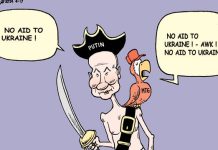
I suppose that some people might have considered Terry Anderson and Jackie Combest an odd couple.
There was the physical thing. Terry was a short black guy, and Jackie a blind white guy.
They were a familiar sight in the downtown neighborhood in which they lived for something like 50 years, Terry walking alongside Jackie, sometimes providing him with instructions on upcoming obstacles, but mostly talking about things of common interest. They had a lot to talk about.
Both were what could be called “down home” boys who lived in a neighborhood that had been overlooked, sometimes ignored, by the rest of Columbus. Their neighborhood was described in various terms through a good part of the 20th century: transitional in the most polite form, eyesore in the bluntest and least compassionate.
Terry and Jackie were not exactly movers and shakers, and they certainly weren’t counted as two of the usual suspects who managed to get things done through a tight network of influential community contacts.
Funny thing is that they got a lot of things done in their own way. Mostly they restored pride in the downtown among those who lived there. Along the way they gained a lot of respect for their neighborhood from the rest of Columbus.
They also earned a great deal of respect for themselves, a respect made more poignant by Terry’s death Oct. 4 at his home.
“Terry was just a good friend,” Jackie said simply last week. “We never saw things in terms of black or white.”
The two Kentucky transplants moved to Columbus in the 1960s but did not really become friends until the 1970s. They often laughed about their physical dissimilarities, choosing instead to focus on what they had in common. One was a concern for the condition of their neighborhood, particularly a small patch of land near Ninth Street called Wilson Street Park.
At the time in the 1990s, park usage was pretty limited. Children didn’t play in the park, but drug dealers found it an ideal site to complete their transactions. It was constantly overgrown with weeds, and parents worried that their children might wander into a nearby abandoned home replete with pitfalls.
Terry and Jackie along with several other neighbors had made repeated efforts to get something done about the area. They even formed an organization called “Friends of Wilson Street Park.” “We were told so many times that this or that was going to happen,” Jackie remembered. “Truth is that nothing happened.”
Most people would have eventually become discouraged at that kind of benign rejection. Not Terry. He continued to look for ways to get things done.
“I remember one day he knocked on my door and said there was something going on in the neighborhood, and we needed to find out what was happening,” Jackie said. “That was when we came together with Randy Allman and Diane Doup.”
Randy and Diane were the first and only staff members of a pilot project launched by the Children, Youth and Families Initiative, an outgrowth of the Project 2000 mission designed to improve the quality of life for families in underprivileged areas. The downtown had been identified as one of those areas.
“In a way, I think Terry and Jackie were testing us,” Randy, who is the director of Lincoln-Central Neighborhood Family Center, said of that first meeting in the 1990s. “It was a kind of put-up or shut-up moment.”
As it turned out, the moment was a put-up one. One of the most pressing needs of the Friends of Wilson Street Park was action on the abandoned home near the park.
“It all started with a call to Mike Ryan (then president of Irwin Union Bank and Trust Co.), and that got the ball rolling on the way to obtaining the funds for the eventual demolition of the building,” Randy said. “I think that accomplishment was instrumental to establishing a sense of trust among the residents of the area.”
Some might credit the efforts of the Wilson Street Friends as the seeds for creating Lincoln-Central Neighborhood Family Center. That wouldn’t be accurate, since steps had already been taken to develop such an association. On the other hand, it can be said that the Wilson Street group morphed into Lincoln-Central.
So did Terry and Jackie. They didn’t stop at bringing the attention of the park to those with the resources to do something about it. They became part of the process, recruiting their neighbors to assist in the rehabilitation of the park.
“I remember that we had created a sandlot area and laid the groundwork for a brick wall around part of it,” Jackie said. “We were worried that vandals might come by in the night and topple those walls, so Terry and I got lawn chairs and sat out there talking from 5 p.m. to midnight.”
That was 30 years ago, but the relationship between the center and the neighborhood friends only grew.
“Their voices definitely lent a great deal of authenticity to the center,” Diane Doup, community outreach coordinator for the center, said. “In a way, they became community leaders in their own right.”
Their activity with the center only increased after the Ninth Street project. Both became members of the LCNFC board of directors, and Terry served as an early president.
They participated in and involved their neighbors in a number of community projects, such as the “Save the Crump” effort.
Terry often stepped out of his comfort zone. He graduated from Leadership Bartholomew County and was one of the participants in the Stephen Covey Seven Steps to Success program.
But his friendship with Jackie remained unchanged. If anything, it deepened.
“I lost a good friend,” Jackie said last week. So did the community that they helped make better.
Harry McCawley is the former associate editor of The Republic. He can be reached at [email protected].




